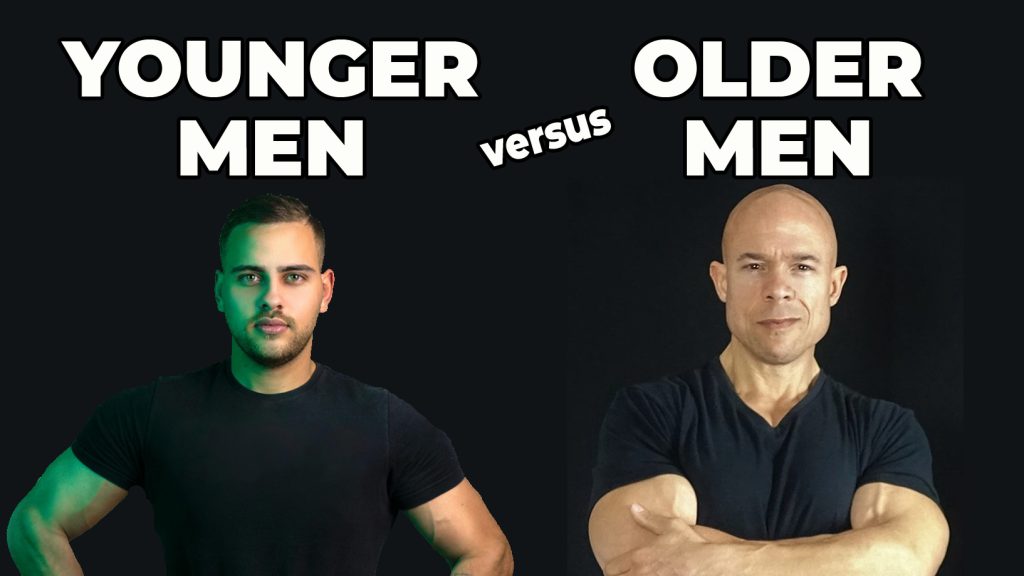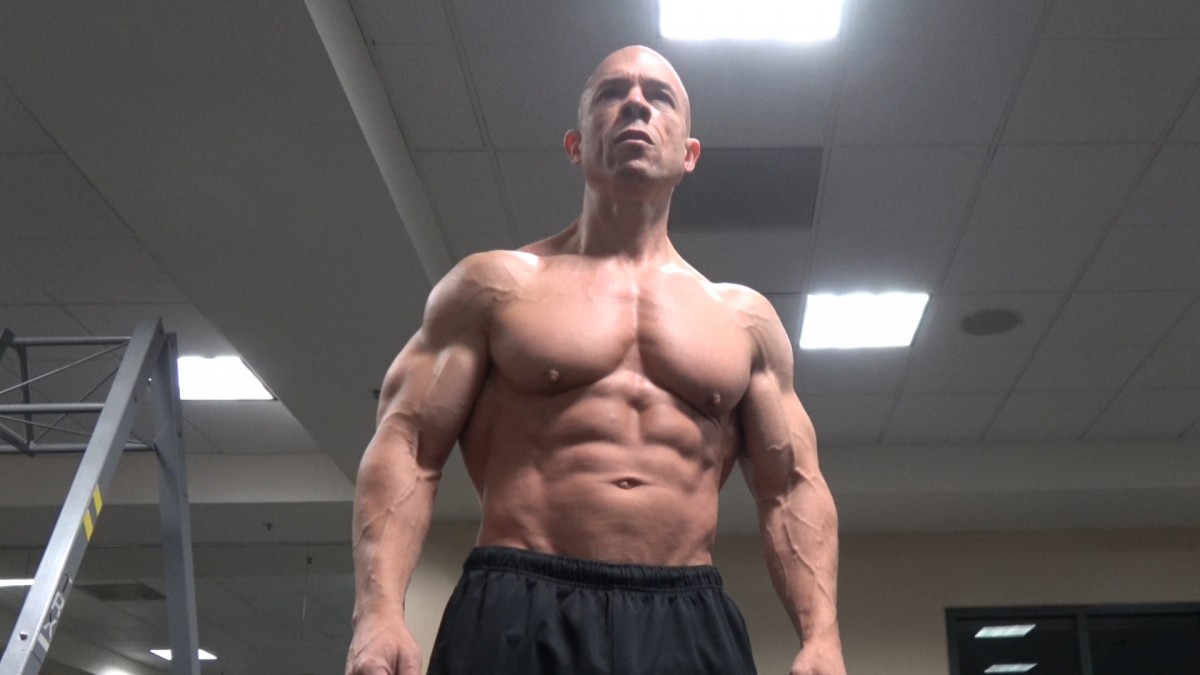 You probably found me through a Google search for “workouts for older men” or by seeing one of my social media posts or podcasts. You might not have known that I’m a former 6-time national drug-free bodybuilding champion with over 36 years of experience in health and fitness. But that’s okay, because my mission now is to help older men like you get fit without letting it take over your life.
You probably found me through a Google search for “workouts for older men” or by seeing one of my social media posts or podcasts. You might not have known that I’m a former 6-time national drug-free bodybuilding champion with over 36 years of experience in health and fitness. But that’s okay, because my mission now is to help older men like you get fit without letting it take over your life.
After nearly a decade of focusing exclusively on older men’s fitness, I’ve learned a lot about the key differences between building muscle and losing body fat as we age.
Let’s Connect! At the end of this article, you’ll have the chance to connect with me directly, get your most pressing questions answered, and receive personalized help. Just text me your picture and fill out the questionnaire at the bottom.
When it comes to fitness, age plays a significant role in shaping priorities and approaches. Younger men and older men often have different motivations, methods, and mindsets when it comes to working out. Here’s how these differences manifest in various aspects of fitness.
#1 – Fitness Journey: Look vs. Health
Younger men often embark on their fitness journey with a primary focus on aesthetics. The desire to look better in the mirror, build muscle, and achieve a lean, chiseled physique tends to dominate their motivations. While they might acknowledge the health benefits of exercise, these usually take a backseat to the pursuit of physical appearance.
On the other hand, older men, while still wanting to look good, prioritize health and longevity. As we age, the realization sets in that more time is behind us than ahead, and the focus shifts from merely looking good to living well. Fitness becomes a means to improve quality of life, maintain mobility, and function optimally all the way to the end. It’s about preserving health, preventing injury, and ensuring that life remains vibrant and enjoyable.
#2 – Volume Of Training And Wear And Tear
Younger men often adhere to the belief that more is better when it comes to working out. The idea of overtraining or overdoing it rarely crosses their minds, as they feel invincible and are willing to push their bodies to the limits in the pursuit of gains. However, this approach can lead to long-term consequences that they might not fully appreciate until they are older.
In contrast, wise older men understand that excessive training volume can contribute to a host of issues such as back pain, shoulder pain, knee pain, and other joint problems. With experience comes the knowledge that it’s not just about how much you train, but how smart you train. Older men know the importance of balancing intensity with recovery, avoiding unnecessary wear and tear, and listening to their bodies to prevent injuries that could sideline them.
#3 – Risks vs. Rewards In Weighlifting
When it comes to lifting weights, younger men tend to take more risks. They often prioritize lifting heavier weights to build muscle faster, sometimes at the expense of proper form and safety. Injuries are seen as temporary setbacks, easier to overcome due to their body’s quicker recovery capabilities.
Older men, however, approach weightlifting with a more measured and cautious mindset. The stakes are higher because injuries can have more significant and lasting impacts. As a result, older men prioritize form, safety, and consistency over sheer weight and intensity. They understand that avoiding injury is crucial to maintaining long-term fitness and overall health.
#4 – Recovery Time
The recovery process is another area where age makes a big difference. Younger men can usually train their muscles more frequently and with higher volume, bouncing back quickly from intense workouts. Their bodies are resilient and can handle the demands of rigorous training.
In contrast, older men often find that recovery time is longer and requires more attention. The body’s ability to repair and regenerate slows down with age, making it essential to allow adequate time between workouts. Older men also recognize the importance of incorporating recovery practices such as stretching, mobility work, and proper nutrition to support their training efforts.
#5 – Cardiovascular Training: Fat Loss vs. Heart Health
Younger men might shy away from cardiovascular training, fearing that it could hinder their muscle-building goals. The emphasis is often on gaining mass and achieving a more muscular physique, with cardio being seen as a potential threat to those objectives.
Older men, however, understand the importance of cardiovascular training for overall health, particularly for heart health, oxygen circulation, and blood flow. As we age, maintaining a strong cardiovascular system becomes essential to support longevity and prevent age-related health issues. Cardio isn’t just about burning calories—it’s about ensuring that the body remains functional and healthy as the years go by.
#6 – Diet: How Much To Eat And The Important Of Food Quality
Younger men often have the luxury of eating more food to fuel their workouts and muscle growth. They might focus primarily on calorie intake, prioritizing quantity over quality as they aim to build muscle or lose fat.
For older men, however, the importance of food quality becomes increasingly critical. Conditions such as diabetes, high blood pressure, and high cholesterol become real concerns, and diet plays a significant role in managing these health risks. Avoiding processed foods and prioritizing nutrient-dense, whole foods become essential for maintaining health and vitality. Even if an older man looks lean and fit, the quality of the food he consumes can significantly impact his overall health.
#7 – Bulking And Cutting
The practice of bulking and cutting, popular among younger men as a way to gain muscle mass, is less appealing and often ill-advised for older men. Bulking can lead to unnecessary fat gain and strain on the body, which can be detrimental to health as we age. The pursuit of a few extra ounces of muscle simply isn’t worth the risks involved, especially when it comes to managing weight and maintaining cardiovascular health.
Older men tend to avoid the mental trap of trying to get as big as possible, recognizing that it’s more important to stay lean, healthy, and functional rather than chasing an ideal that may be unrealistic or harmful.
#8 – Time Constraints And Responsibilities
Another key difference between younger and older men is the amount of time and energy they can dedicate to fitness. Younger men often have fewer responsibilities and more freedom to invest in their fitness goals. They can afford to spend more time in the gym and focus more intensely on their physical development.
Older men, however, often have more responsibilities, with families, careers, and other obligations that demand their time and energy. Fitness becomes one part of a balanced life, and the challenge is to integrate it in a way that supports overall well-being without sacrificing other important aspects of life.
#9 – Willpower, Energy, And Sacrifice
Finally, the willpower, energy, and willingness to make sacrifices for fitness tend to differ with age. Younger men might be more willing to make sacrifices for their fitness goals, often driven by the desire to look good and prove themselves. They have the energy and the drive to push harder and make fitness a central focus of their lives.
Older men, with less time and more responsibilities, may find it more challenging to maintain the same level of dedication. However, they are often more strategic in their approach, focusing on sustainability and long-term health rather than short-term gains. The sacrifices they make are more calculated, aimed at ensuring that fitness enhances their life rather than dominates it.
Conclusion
The approach to fitness evolves with age, shaped by changing priorities, responsibilities, and the realities of aging. While younger men might focus on looks, strength, and pushing their limits, older men tend to emphasize health, longevity, and sustainability. Both approaches have their merits, but as we age, the wisdom lies in adapting our fitness routines to support a vibrant, healthy life that we can enjoy for years to come.
Get My Help By Telling Me About Your Fitness Journey (At No Charge) By Filling Out The Questionnaire Below

🎯 𝗗𝗶𝗿𝗲𝗰𝘁 𝗥𝗲𝘀𝗽𝗼𝗻𝘀𝗲 𝗙𝗿𝗼𝗺 𝗠𝗲 – 𝟭𝟬𝟬% 𝗚𝘂𝗮𝗿𝗮𝗻𝘁𝗲𝗲𝗱! 🎯
Are you feeling stuck or struggling to reach your fitness or life goals? I want to help you.
Fill out this questionnaire at the bottom of the page. I promise you a 100% direct response from me—whether it’s an email with some helpful links, a quick text, or even a phone call to work through your challenges.
Your Coach,
Skip La Cour
Workouts for Older Men
(925)352-4366
Take These Two Easy Steps
1. Text Me Your Picture and Introduce Yourself. Text me a picture at 925-352-4366 so I can see where your body is now. I’ll be able to help you even better. A picture does indeed tell me a “1,000 words” and we’ll be more efficient with our time when we speak on the phone. Whatever you feel comfortable with is fine. I can tell a lot even with your shirt one.
2. Fill Out The Questionnaire Below. This questionnaire will help me learn more about you. Not only will it help me learn more about you and better serve your needs, it will help you gain more clarity as to what you want and what may be stopping you from getting it.
Expect me to reach out to you very soon. I’ll contact you by text, phone call, or email.
Fill Out This Questionnaire For Older Men
WATCH THIS VIDEO BEFORE YOU CLICK “SEND”
If there’s more you want to tell me about your situation and you’ve already submitted your questionnaire, send me an email at [email protected]
Welcome to the Workouts for Older Men Fitness Journey
In this video, I talk about the fitness journey that’s ahead of you.
To learn more about my one-on-one fitness coaching, go here.
Read what it is all about. Fill out the questionnaire. Read testimonials for me like you here.
You can also call or text me at 925-352-4366. WhatsApp is +19253524366. We’ll set up some time to talk to see if one-on-one coaching is a good fit for you.
